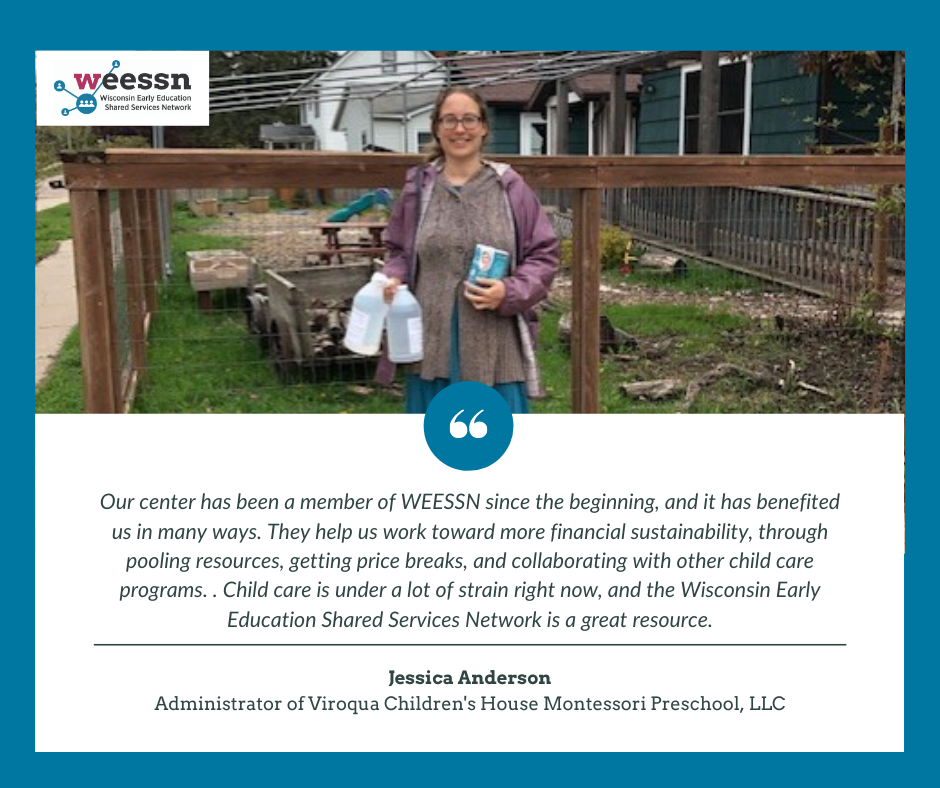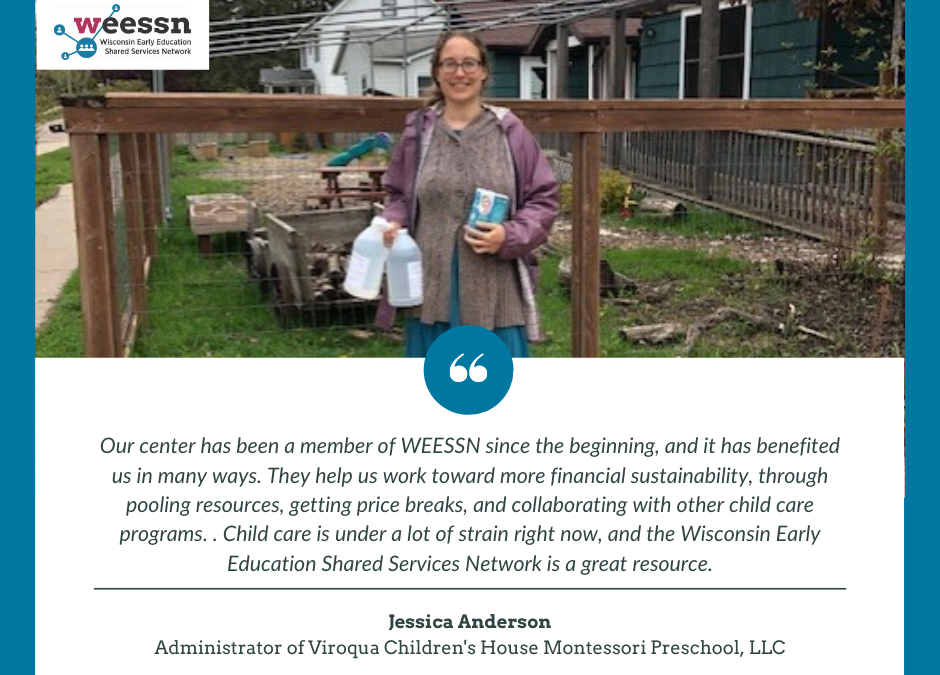According to the National Association of the Education of Young Children, an estimated 40% of child care programs around the country will close before the end of the pandemic, making it even more difficult for communities to recover economically. However, one organization in Wisconsin, the Wisconsin Early Childhood Association (WECA), is bucking this trend.
WECA launched the Wisconsin Early Education Shared Services Network (WEESSN) to serve as a catalyst for stabilizing the child care market and elevating the quality of care for children in Wisconsin. WEESSN brings together family and group child care programs to pool resources and leverage economies of scale. By using innovations in technology and shared administrative tasks, WEESSN lowers costs and saves time for child care providers that can be reinvested into quality programming for children.
WEESSN was inspired by community conversations within Vernon and Monroe Counties to address the supply and demand of child care issues that plague this sector. This community is considered a child care desert, meaning that there is only one child care slot available for every three (or more) children. With initial funding from Advancing a Healthier Wisconsin Endowment, WEESSN was piloted among a handful of programs in 2019.

Today, there are nearly 140 programs enrolled in the network serving approximately 3,900 children and operational in 11 counties, including: Crawford, Dane, Grant, Green, Iowa, Jackson, Lafayette, Milwaukee, Monroe, Richland, and Vernon Counties. This expansion is made possible with generous support from Schmidt Futures, the Dan and Patti Rashke (TASC) Family Foundation, Madison Community Foundation, Schlecht Family Foundation, Wisconsin Partnership Program at the University of Wisconsin School of Medicine and Public Health, Wisconsin Department of Children and Families (through the Preschool Development Grant), among others.
During the economic and health crisis, it’s clear that WEESSN has been a lifeline to child care programs. In fact, compared to approximately 40% of programs that are expected to close due to the pandemic without additional federal investments, WEESSN-enrolled programs have only seen a 1% closure rate.
The high touch coaching and mentoring from WEESSN staff has ensured programs apply for every dollar of relief funding available and moreover, understand how to be as efficient as possible with spending. What’s more, WEESSN, in collaboration with other community stakeholders and partners, secured donations of more than 2,100 gallons of hand sanitizer from Stateline Distillery, 3000 masks to protect early childhood staff and the children they serve, air purifiers for 80 classrooms, and dozens of no-touch thermometers. And finally, WECA has secured $600,000 in funding to help stabilize the early care and education sector, including child care programs enrolled in WEESSN.
Experts around the country agree that the business of child care must evolve to survive and shared service networks, like WEESSN, are an innovative way to meet that challenge. Furthermore, our local, regional, and national partners understand that child care is the backbone of a thriving community. In fact, high quality early care and education is critical for working families, employers that want to attract and retain qualified staff, and for promoting optimal development of young Wisconsin children.
The trend toward making programs like WEESSN widely available is evidenced in a recent capacity building grant award in the amount of $75,000 from Otto Bremer Trust. Otto Bremmer is a bank holding company and a private charitable trust based in Saint Paul, MN that works at the intersection of finance and philanthropy. Otto Bremer’s investment will help build capacity of WEESSN and strategically scale this successful model. This, in turn, will help stabilize more child care programs, especially in rural Wisconsin where 70% of families were living in a child care desert pre-COVID19. Simply put, this investment will allow us to create more robust services for all WEESSN programs by building upon the knowledge and expertise from each regional cohort in both urban and rural areas of the state to streamline an effective and sustainable infrastructure. This includes technology (child care management software), contextualized business coaching (back office support, such as payroll, billing, etc.), and administrative/programmatic leadership.
Jessica Anderson, Administrator of Viroqua Children’s House Montessori Preschool, LLC, shared this about her experience with WEESSN:
“Our center has been a member of WEESSN since the beginning, and it has benefited us in many ways. They help us work toward more financial sustainability, through pooling resources, getting price breaks, and collaborating with other child care programs. They regularly disseminate information from the state, with additional guidance. I’m glad we were already up and running before the coronavirus pandemic because WEESSN staff was extremely helpful in helping us understand the evolving regulations; they even had lawyers to advise the development of our new health checks and sick policies. They organized group chats as well so that we could help each other find the best solutions; and even got us donations of hand sanitizer at no cost. Child care is under a lot of strain right now, and the Wisconsin Early Education Shared Services Network is a great resource.”
Stay tuned for future updates on WEESSN’s expansion and meaningful impact.

